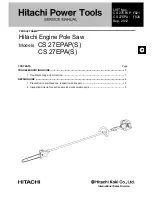
9
6 - DISPOSITIVI DI SICUREZZA
Tutti i rischi relativi all’uso di macchine di questo tipo
sono stati studiati e, per quanto possibile, eliminati.
Data la necessità di dover guidare il pezzo in prossi-
mità dell’area di lavoro delle lame, non è possibile
eliminare i rischi imputabili ad eventuali contatti acci-
dentali delle lame con le mani dell’operatore. I rischi
residui correlati al modo di lavoro manuale sono:
- Taglio (dovuto al contatto delle mani con le lame)
- Impigliamento (dovuto ad abiti non opportunamen-
te attillati)
- Proiezione di schegge del materiale in lavorazione
Per ridurre al minimo le conseguenze dei suddetti
pericoli, occorre attenersi in modo scrupoloso alle
seguenti istruzioni:
1 - Evitare di tagliare pezzi di asta con lunghezza infe-
riore ai 50mm
2 - Non usare mai le mani per togliere i pezzi corti e/
o ritagli in prossimità delle lame, ma servirsi di un
attrezzo possibilmente in legno
Le soluzioni prese per lavorare con la troncatrice in
massima sicurezza sono le seguenti:
a - Per comandare la discesa delle lame è necessa-
rio agire simultaneamente sui due pulsanti in fig.19
In questo modo le mani dell’operatore sono occupa-
te a distanza di sicurezza e, se una mano si allonta-
nerà dai due pulsanti, le lame ritorneranno in posi-
zione di riposo.
(dove concesso la macchina può essere fornita con
un azionamento a pedale).
b - La macchina presenta un dispositivo di tenuta
della cornice tramite due pressori pneumatici (fig.20).
Questo dispositivo agisce automaticamente premen-
do i due pulsanti che comandano la discesa delle
lame facendo scendere i due pressori in anticipo
rispetto a queste ultime e ritornando in posizione di
riposo solamente a lame sollevate. Se attivati dal
pedale i pressori agiscono solo a bassa pressione
(2 Atm)
6 - SAFETY DEVICES
All risks related to the use of this type of machines
have been studied and most of them solved. It was
not possible to avoid the risk of accidental contact
between fingers and saw blades as it is necessary
to drive the mouldings in the cutting area.
The residual risks related to the working system of
the machine are the following:
- Cut (due to contact between fingers and saw
blades)
- Entrapment (due to not proper apparel worn)
- Ejection of small parts of the working pieces
In order to reduce the possibility of accident due to
the above mentioned residual risks follow
thoroughly here under instructions:
1 - Do not cut the mouldings in pieces shorter than
50mm
2 - Never use your hand to remove short pieces that
lay close to the saw blades (Use a tool possibly in
wood)
The solutions that allows the operator to work with
the maximum safety are the following:
a - To make saw blades move up and down it is
necessary to push simultaneously the pushing
buttons of pict.19. In this way the operator hands
always remain at a safety distance from saw blades.
In fact relieving only one hand from push buttons
the saw blades come back to rest position.
(Where admitted the machine may be delivered with
foot operated valve instead of pushing buttons)
b - Two pneumatic clamp cylinders (pict 20) block
the mouldings during cutting operation. They block
the moulding before the saw blades unit starts its
cutting movement and release it only after that saw
blades come back in rest position. If pedal activated,
the clamp cylinders work to low pressure (2 Atm)
19
20
Summary of Contents for C18 Plus
Page 21: ...D D D B C C C C B C B B A...
Page 57: ...6800008 SX LEFT 6800009 DX RIGHT...
Page 58: ...68250 68251 60042RS 160056 32042RS 101017 101007 DX 101007 SX 101010 30083 DX 30083 SX...
Page 60: ...PM5X10 30005 102116 68200 68202 68201...
Page 61: ...PM8X15 T005c OPT009g 25066 M6X15 TV0802 TV0808...
Page 62: ...160161 RM102 DX RIGHT RM101 SX LEFT AX 25 5 68430 SX LEFT 68431 DX RIGHT 68432...
Page 63: ...68441...
Page 64: ...30067 30068 M8X20 23147...
Page 65: ...30085 30086 16 140 PM6X16 68067...
Page 66: ...68433 SX LEFT 68434 DX RIGHT...
Page 68: ...QE380SA2...
Page 73: ...QS FU1 TC1 KM1 2 FR1 2 SP FU 2 3 4 SB3 SB2 SB1 HL...
















































